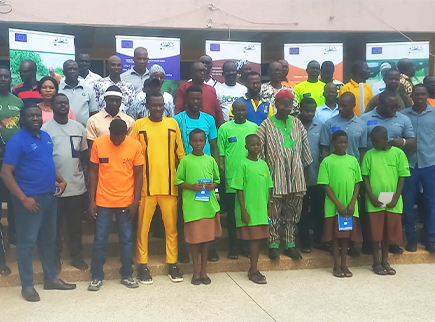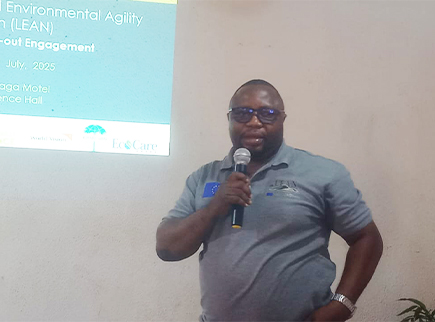World Vision Ghana has called on communities that benefited from the European Union-funded Landscapes and Environmental Agility across the Nation (EU-LEAN) project to take ownership of the interventions and sustain the gains made under the project.
Speaking at the close-out ceremony of the project, which ended in April 2025, at Paga in the Kassena-Nankana West District, Mr Rexford Yamdorg Bugre, Regional Operations Manager for the Northern sector of World Vision Ghana, urged the beneficiary communities to own the intervention and sustain it.
The four-year project, which began in 2022, was implemented by a consortium led by Rainforest Alliance, World Vision Ghana, Tropenbos Ghana, and EcoCare Ghana in the savannah, high forest, and transition zones of Ghana.
The project aims to directly contribute to national efforts at conserving biodiversity, improving the livelihoods of smallholder farmers, increasing climate change resilience, and reducing emissions from land use.
It also seeks to implement integrated landscape management models in the three priority landscapes through functional and sustainable landscape governance structures.

In the Kassena-Nankana West and West Gonja Districts, where World Vision Ghana was the implementing organisation, 50 communities (25 in each district) benefited from the intervention, leading to several hectares of degraded land being restored while improving the livelihoods of the people through the Farmer Managed Natural Regeneration (FMNR) approach.
FMNR is an easy and low-cost land and forest restoration technique used to increase the number of trees in the field without necessarily planting new ones but by protecting and managing existing trees and shrubs through pruning to enable them to regenerate naturally.
He said the project, through FMNR, had empowered communities with tools and knowledge to manage their natural resources effectively, curb bushfires, improve soil fertility, adopt climate-smart farming methods, and build resilience to climate change.
“These areas of protection or conservation do not belong to World Vision; they are owned by the community, so sustain the gains made so that in years to come, you will benefit from these interventions,” he said.
Touching on the achievements of the project, Mr Joseph Edwin Yelkabong, the Manager for the EU-LEAN project at World Vision Ghana, said a total of 411 hectares of degraded landscapes and forest reserves were under restoration in both districts through the FMNR approach.
Apart from the above, he said the project further introduced alternative livelihood interventions to the communities to reduce their overdependence on the environment for survival.
He said the project trained about 500 smallholder farmers on FMNR approaches and produced and planted 134,061 seedlings of varied species across the 50 communities as part of the restoration efforts.
“We have also distributed 200 beehives and their accessories to 171 smallholder farmers, with 51 gallons of honey harvested, which has so far been valued at GH₡20,400.00,” he added.
He also indicated that 115 Saving for Transformation (S4T) groups, a local banking system, were established, with more than GH₡1 million saved and more than 2,800 people accessing small loans to address emergencies and start or expand their small businesses.
Mr Robert Dampare, Chair of the LEAN Landscape Management Board, Kassena-Nankana West District, commended World Vision Ghana and its partners for the successful implementation of the project, which he said had helped restore degraded lands, improved food security, and enhanced incomes in many communities.

